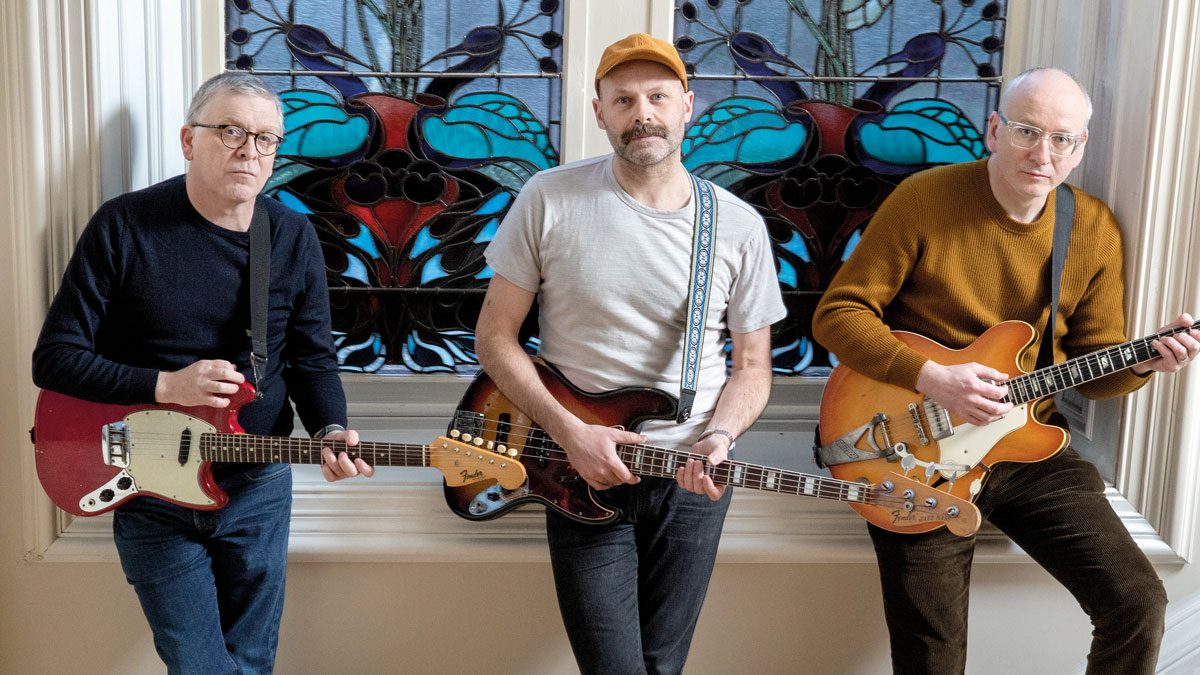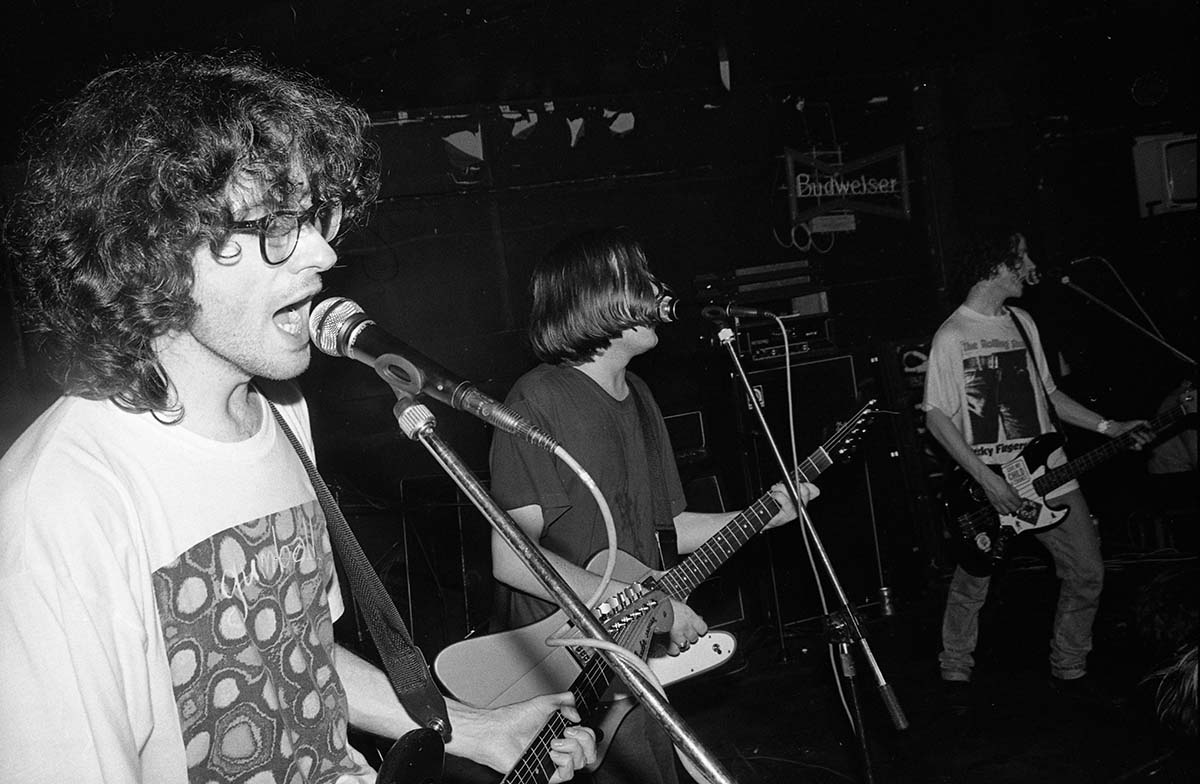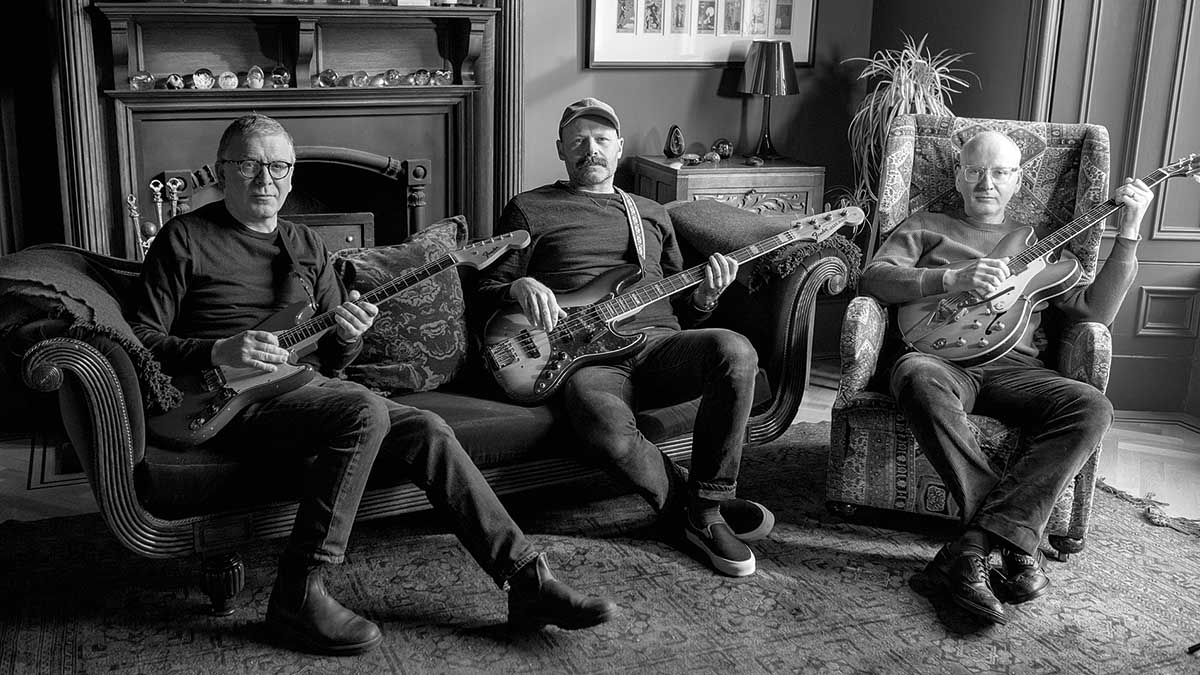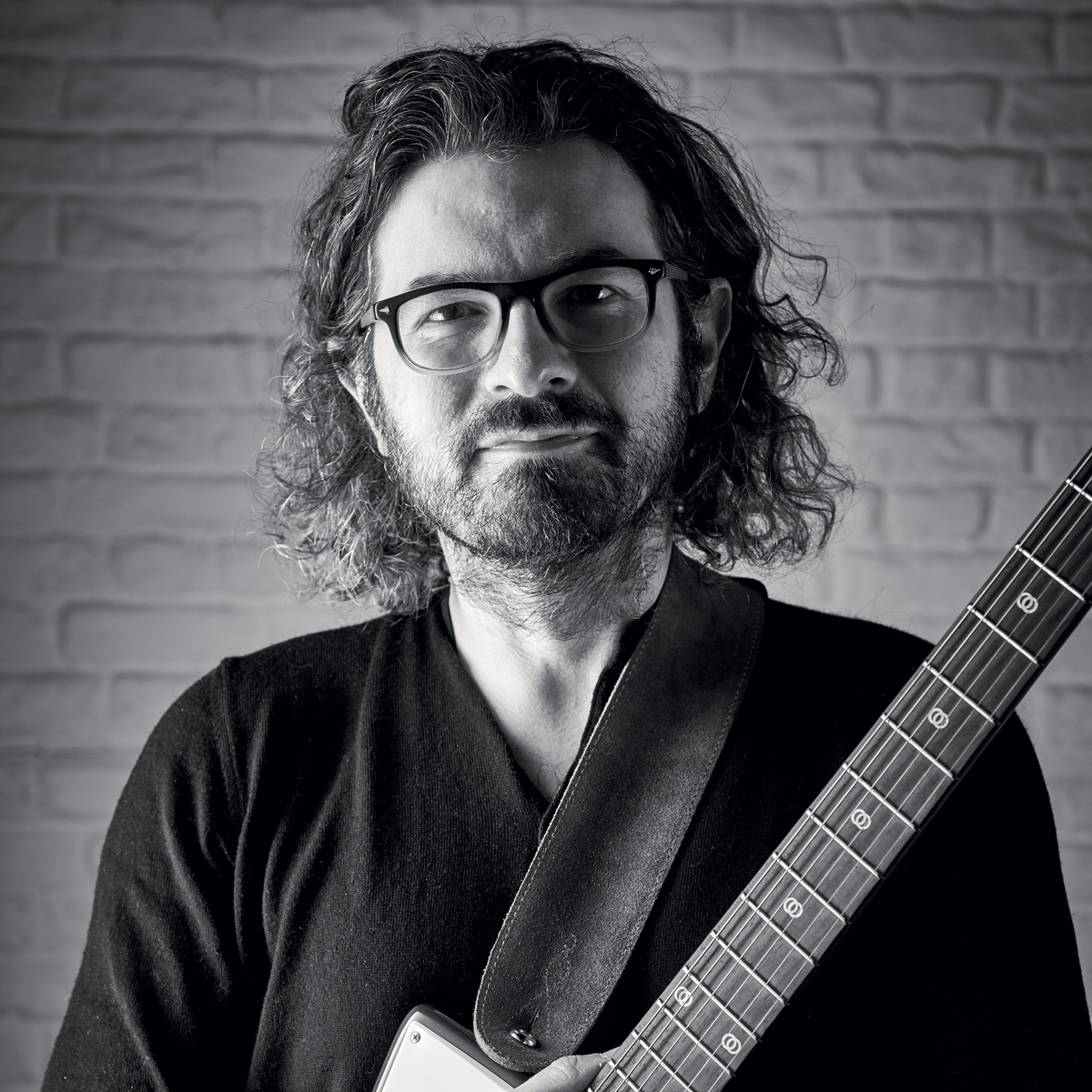Teenage Fanclub on the art of constructing solos, emulating Robert Fripp, and the pursuit of tone
On Endless Arcade, Scotland's finest contemplate life, mortality and all in between. “Everything is going to fall apart but it’s not so bad,” says McGinley

Since their formation in 1989, the thumbnail sketch of Teenage Fanclub has been a band for the good times, trading in blissed-out, beatific, Byrdsian jangle, with vocal harmonies so close you couldn’t fit a plectrum between them.
But the Glaswegian group once dubbed “the best band in the world” by Kurt Cobain would never have sustained a three-decade career, nor commanded such a loyal army of fans, without the brains and bite that temper those innately optimistic chord voicings.
Tracked live at Hamburg’s Clouds Hill Recordings, eleventh album, Endless Arcade, finds the band walking the same tightrope, with co-founding guitarists and songwriters Norman Blake and Raymond McGinley evoking autumn sunshine from their instruments, on songs that are touched by sorrow, loss and the hand of mortality. “You go through life,” says McGinley, “and everything is going to fall apart. But it’s not so bad.”
Endless Arcade is such an evocative album title. What made you choose it?
Norman Blake: “I just liked the sound of those two words together, and also the song Endless Arcade, by Raymond, which talks about our journey through life. I think we’ve always shied away from pretentious album titles. Even when we started the band, we were looking for the dumbest or least pretentious name we could come up with up. Ironically, none of us were teenagers when we started Teenage Fanclub. I think I was 22.”
What themes came up for you on this album?
Raymond McGinley: “We just try to bring things out of ourselves. It isn’t necessarily conscious, but the process of playing a guitar is meditative or contemplative, and you’re trying to either zone out or tune into things inside yourself.
Get The Pick Newsletter
All the latest guitar news, interviews, lessons, reviews, deals and more, direct to your inbox!
“A lot of Norman’s songs on this record are dealing with things he’s gone through in his life. My songs are more like me pulling things out of my subconscious, then trying to reverse-engineer something around it.”
Norman: “Because we’re in our late 50s, a lot of the songs are about us reflecting on our place in the world. As you grow older, you’re going to start thinking about mortality – y’know, family members passing away – and looking back over the journey that’s brought you to this point in your life. So, inevitably, that’s going to come through in the lyrics. This album couldn’t have been written by someone in their 20s.”
Can you describe your dynamic as songwriters and guitar players?
Norman: “It’s like the Chuckle Brothers – ‘to me, to you.’ I think Raymond’s chord progressions are more unusual than mine, and I mean that in a positive way. Very often, a lot of Raymond’s songs are arpeggio-based, which kind of differentiates us as writers.
“Raymond will always come up with a twist. So he is absolutely the lead guitar player, and I take the odd solo, but when it comes to being creative and coming up with something interesting, we always turn to Raymond. He’ll always do something you’re not expecting. So he’s a great asset to have. And if I was doing a solo, it’d probably be a bit more bog-standard. So we’re lucky to have him.”
When it comes to being creative and coming up with something interesting, we always turn to Raymond. He’ll always do something you’re not expecting
Norman Blake
What were your go-to guitars for this album?
Raymond: “Over the years, I’ve had loads of guitars, but we keep coming back to the same ones. My first main guitar is a ’63 Fender Jaguar. I bought that in 1983 when it was 20 years old or something. I wasn’t even a teenager at the time. And then a mid-60s Epiphone Casino: it’s a ’66 or ’67.
“Those guitars, I’ve had since the 80s. They’re the first guitars I got and they’ve turned out to be the best guitars I’ve got. It’s great sometimes to see a picture of me and Norman – before Teenage Fanclub, say, in The Boy Hairdressers – and I’d be playing the Jaguar and Norman was playing the Casino.”
Norman: “Pretty much on every track, I’d start with the 335 that I’ve had since the early 90s. It’s a 1970, I think. I picked it up for $300, somewhere in the Midwest. We were always looking in guitar stores in these little towns and this 335 was absolutely mint condition, hardly a mark on it. There was a little indentation where a guitar cable had been lying on the lacquer. Other than that, it was perfect.
“We’ve got a lot of guitars. That’s partly because we’re old and we’ve been around forever. For the acoustic parts, we’ve got a Martin 000-18. Before that, I had a nice Taylor, and that was the only guitar I’ve ever had stolen, in Australia. After that, I bought this 000-18. People always told me, ‘Yeah, Martins get better with age.’ Well, blow me away – they do. This was 20 years ago and the more I use it, the better it sounds.”
We’ve got a lot of guitars. That’s partly because we’re old and we’ve been around forever
Norman Blake
Raymond, have you had any on-the-road guitar incidents you can share?
Raymond: “Once, we did a gig in London and our guitar tech came in to see me with a very worried look. And he said, ‘I’m really sorry, a taxi has just run over the case with your Epiphone Casino in it.’ I was like, ‘Was anyone hurt?’ And he’s like, ‘No, no. We haven’t looked in the case yet, but it doesn’t look too good.’
“And I was like, ‘Well, I’ve had a good run on it. Whatever happens, don’t worry about it.’ And when I went and looked, the taxi hadn’t actually run over it, just kind of mangled the case, and the guitar was fine. But I had that moment of thinking, ‘I think that guitar is over.’”

What was your amp setup for this album?
Norman: “I was playing through a little Silverface Fender Champ. Again, from 1970 or thereabouts. One thing I’ve been using a lot is the Xotic EP Booster. I switch it on, but then turn the volume down to zero, so it’s just going through the circuit, and it gives it a real richness. That was pretty much the signal path.”
Raymond: “Mostly, the sound of the rhythm guitars is pretty much just off the amp. I’ve got a nice Fender Deluxe, a '50s one, that I’ve had for about 30 years. I was lucky to buy it when you could still buy things like that without being a stockbroker. So that amp sounds really pure and chiming when you want it to be. If you want to just turn it up, it gets your classic distortion. And you can get it all out of the amp by turning it up or down a bit. Sometimes just turning the amp up sounds better than trying to do it with a pedal.”
You get a lot more audio information when it’s just the amp, don’t you?
Raymond: “Yeah, I think you get a lot more dynamic connection. Let’s say with a Fender Deluxe: if you hit a bit harder, it breaks up; if you back off a little bit, the playing just sounds cleaner. It kind of responds to how you play. So you get something from that. Y’know, if you’re hitting it a bit harder in the chorus, the sound changes. It’s not like you have to turn on a pedal or something.”

It’s a lost art, isn’t it, using the guitar’s volume control and the amp’s dynamics to get different sounds?
Raymond: “I was a bit of a purist when I first started off. The band that me and Norman were in before Teenage Fanclub – The Boy Hairdressers – I didn’t have any pedals. I just kind of wanted to be old-school.
“I was using a Fender Jaguar that I still use now and I would just back off the volume then turn it up to do the lead. But I remember, I modified the capacitor on the volume dial. I can’t remember which way round it was: maybe it got brighter when I turned it up, or maybe it got fatter and then a little brighter when I backed it off. Because when you back off the volume, sometimes it can get really dull and the treble is all rolled off. This is in the '80s, so I was trying to find out how to modify that.”
We just start playing. We’re not picking things apart. And there’s no one Svengali trying to boss everything
Raymond McGinley
What role does a solo play in relation to a good song, do you think?
Raymond: “A lot of times, we like the kind of short, structured instrumental sections. But then again, having said that, the first song on the album, Home, has got a four-minute guitar solo. It’s your kind of classic, self-indulgent guitar solo. So yeah, both are nice.”
Norman, you played the solo in The Sun Won’t Shine On Me, with that unusual EBow-sounding effect. How did you achieve that?
Norman: “I was trying to make it sound like the guitar was going backwards… So I had to kind of push onto the notes to make it sound like that. It’s probably a combination of six or seven different parts. A couple were just feedback parts while some of the others were playing melodic notes. When I put it together, I suppose I was channelling a bit of Robert Fripp and the things he did for David Bowie.”
Because, of course, Fripp did that thing for Heroes where he found the spots on the studio floor where he got the best feedback and he stood on those…
Norman: “Ah, that makes sense. Without knowing that’s how he had done that, I did a similar thing: finding the spot where the feedback sounded sweet and resonated at the right frequencies. That’s amazing that that’s how he did it. The Heroes sound is beautiful.”
One of the things your solos do well – and which has perhaps been a little lost in guitar music – is that sense of pure melody. Where you’re not just improvising on a scale but you’ve determined a melody…
Raymond: “Yeah. I hesitate to criticise any form of guitar playing, but I’d say, with the more freeform solo thing, Jimi Hendrix did it amazingly well, and with other people that have tried to do it – not as much. You’re just never going to get there. But, yeah, for us, it’s about the melodic structure of it, how it works against everything else. We think of it as an instrumental thing, rather than a solo. It just happens to be on guitar, but in another universe, it could be with other instrumentation.”
Over time, the band have maybe become more ‘proper’ musicians, too. Y’know, Dave could give Paul McCartney a run for his money!
Raymond McGinley
Do you like to record with everyone in the room or build the record in layers?
Raymond: “On this record – and we’ve always done this – we just got into the room and picked our spots. So we were all in a circle, looking at each other. We’re so comfortable with each other now that we can do it without too much chat. We just start playing. We’re not picking things apart. And there’s no one Svengali trying to boss everything. Over time, the band have maybe become more ‘proper’ musicians, too. Y’know, Dave [McGowan, bass] could give Paul McCartney a run for his money!”
Norman: “What we’ll do if we’re recording is set everything up in one room. Minimal separation. We’re using small amplifiers and we’ll baffle them off a bit, but we don’t worry too much about spill. We’re all about capturing the performance. On this album, there’s a couple of songs where everything – other than the vocal – was recorded in the first take. Y’know, the guitar break is all done in the take. And that’s something that gives us satisfaction.”
What’s the band’s attitude to capturing sounds in the studio?
Norman: “We spend time getting the sounds, and that’s where I think people are sometimes a bit too hasty – not tuning the drums properly, or making sure the tone of the guitar is exactly what they want. We want to be on the other side doing as little EQ-ing as we have to.
“There’s always something. You might have to compress a vocal a little bit, add some reverb. But, really, in terms of the guitar sounds, I think we’re always satisfied. We might have a high-pass filter to cut out some of the rumble at the bottom there. But other than that, if we can have a flat EQ for the final mix, we’re really happy.”
How do you feel the band has grown musically over time?
Raymond: “Our direction of travel, I would say, is not to be scared to do what instinctively we feel we want to do, whatever that is. And not to feel like we’re conforming to any expectations of ourselves. Just to be comfortable in our skin. Sometimes, people say, ‘Oh, I wish they’d make a record like such-and-such.’ It’s like, ‘Well, we made that record 30 years ago.’ If we tried to make the same record now, it would sound different.”
Norman: “If you listen to our first LP [1990’s A Catholic Education], it’s a bit rough around the edges, and I hadn’t found my own voice at that point. Because when you start a band, you really are the sum of your influences. Maybe in the past, we’d have thrown in everything, including the kitchen sink. Hopefully, we’re just a bit better at putting those ideas across now. But we’re fundamentally still the same band. It’s still about songs.”
- Endless Arcade is out now via Merge.
Jamie Dickson is Editor-in-Chief of Guitarist magazine, Britain's best-selling and longest-running monthly for guitar players. He started his career at the Daily Telegraph in London, where his first assignment was interviewing blue-eyed soul legend Robert Palmer, going on to become a full-time author on music, writing for benchmark references such as 1001 Albums You Must Hear Before You Die and Dorling Kindersley's How To Play Guitar Step By Step. He joined Guitarist in 2011 and since then it has been his privilege to interview everyone from B.B. King to St. Vincent for Guitarist's readers, while sharing insights into scores of historic guitars, from Rory Gallagher's '61 Strat to the first Martin D-28 ever made.
“It holds its own purely as a playable guitar. It’s really cool for the traveling musician – you can bring it on a flight and it fits beneath the seat”: Why Steve Stevens put his name to a foldable guitar
“Finely tuned instruments with effortless playability and one of the best vibratos there is”: PRS Standard 24 Satin and S2 Standard 24 Satin review











